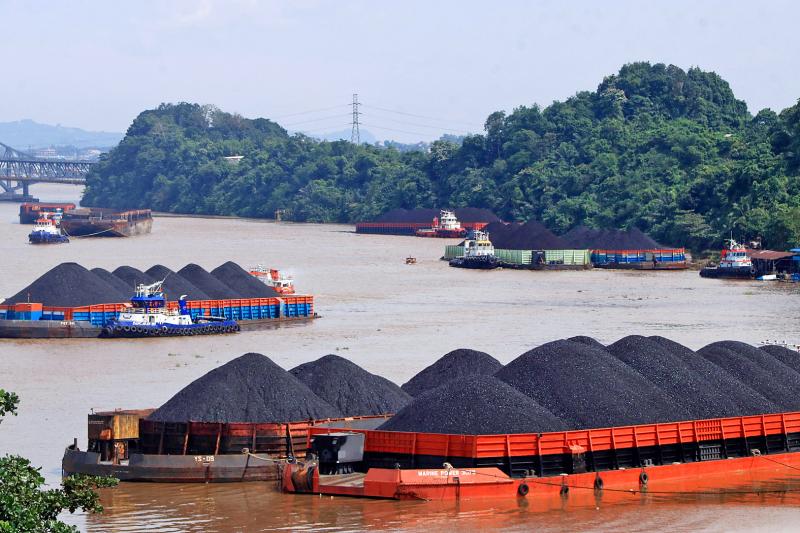Chinese thermal coal futures fell yesterday after Indonesia, the world’s biggest thermal coal exporter, eased a ban on overseas shipments that surprised buyers at the start of the year, alleviating concerns about supply disruptions.
The export ban was introduced after state power utility PT Perusahaan Listrik Negara (PLN) reported critically low coal stockpiles amid complaints miners were not fulfilling their responsibilities to supply fuel to the company.
Driven by concerns about the impact to their economies which depend on coal-fired power generation, the governments of Japan, South Korea and the Philippines called for the measure to be eased.

Photo: AFP
Indonesia late on Monday agreed for 14 coal vessels to depart as soon as they got permits from authorities.
To ensure PLN does not run low on coal again, the government is discussing new procurement policies, including a levy system for miners.
The ban, which came into force on Jan. 1, triggered a rally in Australian and Chinese coal prices last week, but Chinese thermal coal futures yesterday fell more than 3 percent to 685 yuan (US$107.50) in reaction to the relaxation.
“There is still demand for Indonesian coal from Chinese power plants,” one China-based trader said, adding that some might turn to Russian coal as an alternative.
Shares of top Indonesian coal miners PT Bumi Resources Tbk, PT Adaro Energy Tbk and PT Indika Energy Tbk rose in early trading yesterday before paring gains.
The Indonesian Ministry of Transportation had not allowed any export-bound ship with coal to leave ports as of yesterday morning as it awaited a directive from the energy ministry, Sea Transportation Director Mugen Suprihatin Sartoto said.
There were about 120 vessels either loading or waiting to load off Indonesian’s coal ports in Kalimantan on the island of Borneo, Refinitiv data showed.
The Indonesian government is to conduct a review today and if it fully scraps the ban, it would do so gradually as it considers how the resumption affects compliance with so-called Domestic Market Obligation rules, Coordinating Minister of Maritime and Investment Affairs Luhut Pandjaitan said on Monday.
Under the rules, miners are required to sell 25 percent of output to the local market at a maximum price of US$70 per tonne for domestic power plants.
The Indonesian government is mulling a formula that would make miners pay a levy to a government agency, which would use the revenue to help PLN pay for its coal needs at market prices, Luhut said.
Under one possible scenario, miners would pay a levy based on output that would be evaluated periodically depending on the gap between market prices and the US$70 per tonne threshold, an official document said.
The document puts the potential levy at US$3.87 a tonne, which could provide an estimated US$2.5 billion a year to help PLN procure coal.
The government also plans to dissolve PLN’s coal procurement unit, PLN Batubara, so PLN can deal directly with miners and not go through traders, Luhut said.

In Italy’s storied gold-making hubs, jewelers are reworking their designs to trim gold content as they race to blunt the effect of record prices and appeal to shoppers watching their budgets. Gold prices hit a record high on Thursday, surging near US$5,600 an ounce, more than double a year ago as geopolitical concerns and jitters over trade pushed investors toward the safe-haven asset. The rally is putting undue pressure on small artisans as they face mounting demands from customers, including international brands, to produce cheaper items, from signature pieces to wedding rings, according to interviews with four independent jewelers in Italy’s main

Macronix International Co (旺宏), the world’s biggest NOR flash memory supplier, yesterday said it would spend NT$22 billion (US$699.1 million) on capacity expansion this year to increase its production of mid-to-low-density memory chips as the world’s major memorychip suppliers are phasing out the market. The company said its planned capital expenditures are about 11 times higher than the NT$1.8 billion it spent on new facilities and equipment last year. A majority of this year’s outlay would be allocated to step up capacity of multi-level cell (MLC) NAND flash memory chips, which are used in embedded multimedia cards (eMMC), a managed

Japanese Prime Minister Sanae Takaichi has talked up the benefits of a weaker yen in a campaign speech, adopting a tone at odds with her finance ministry, which has refused to rule out any options to counter excessive foreign exchange volatility. Takaichi later softened her stance, saying she did not have a preference for the yen’s direction. “People say the weak yen is bad right now, but for export industries, it’s a major opportunity,” Takaichi said on Saturday at a rally for Liberal Democratic Party candidate Daishiro Yamagiwa in Kanagawa Prefecture ahead of a snap election on Sunday. “Whether it’s selling food or

In the wake of strong global demand for AI applications, Taiwan’s export-oriented economy accelerated with the composite index of economic indicators flashing the first “red” light in December for one year, indicating the economy is in booming mode, the National Development Council (NDC) said yesterday. Moreover, the index of leading indicators, which gauges the potential state of the economy over the next six months, also moved higher in December amid growing optimism over the outlook, the NDC said. In December, the index of economic indicators rose one point from a month earlier to 38, at the lower end of the “red” light.